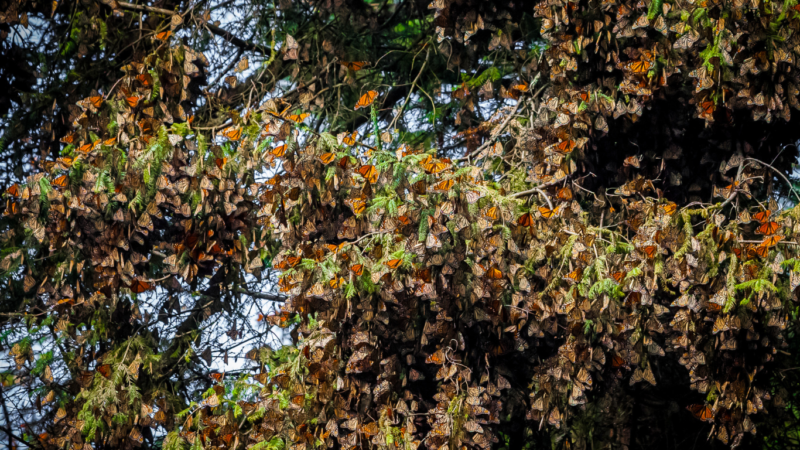
Written by Emily Wrubel, 2024 MJV Mexico Trip Participant
You, like me, probably enjoy seeing monarch butterflies near the end of the summer. You might be vaguely aware of their reliance on milkweed and have heard that they migrate somewhere (California? Mexico?). In February, I took the trip of a lifetime to the Monarch Butterfly Biosphere Reserve in Angangueo, Mexico where our eastern monarch butterflies spend the winter.
For our group of fifteen, getting to the monarchs’ wintering grounds in the mountains of the Transvolcanic Belt involved four hours on a bus from Mexico City, half an hour up steep cobbled roads in the backs of open-air pickups, half an hour on horses led by locals, and, finally, 45 minutes hiking up the last 600 feet of elevation to their current location at 11,100 feet above sea level. Here on the limbs, branches, and bark of the Oyamel fir, they rest, mostly in large clumps, some individually. Most appear immobile and blend in with the woods, as we only see the gray variegated undersides of their wings. The masses of butterflies are heavy, the branches rock gently as a few take off or land. When they fly, they flash beautiful orange, black, and white wings that are a bit worse for wear, having flown some 3,000 miles to get here. They make our own travel seem trivial.
Awestruck by the sheer number of butterflies, I found myself wondering – did any of these magical creatures get their start in my yard in New Hampshire? Several years ago, my closest friend and traveling companion, Judy, gave me some swamp milkweed plants. I’m not a good plant steward and thought I had killed them off, but last summer, they came up again, and on my two spindly stalks, I found four robust monarch caterpillars. I never found their chrysalises, but six months later, as I stared at the monarchs lazily flapping their wings on the Oyamel firs, I wished I could get a glimmer of recognition – some New Hampshire mannerism – that would tell me that my monarchs had survived to adulthood and arrived safe and sound in Mexico.
Now, the children of those monarchs are working their way north. My swamp milkweed has just emerged from the soil, getting ready for their arrival this summer. This time, though, I will know that a few generations ago, their ancestors and I were in the same place, and I may have looked through my binoculars at their great-great-great-grandparents!






###
Join us in Mexico in 2025
The MJV thanks Emily for sharing her experience visiting the overwintering monarchs in Mexico on one of our trips earlier this year. The Monarch Joint Venture exclusively offers this trip, which is managed by Natural Habitat Adventures. If you are interested in traveling with us next year, please contact us at development@monarchjointventure.org.
We have two trips scheduled for 2025. The dates are January 28th - February 2nd and February 16th-21st. The trip costs $5,195 per person. Airfare is not included. The pricing for the trip is based on double/shared occupancy, with an optional upgrade available for $1,195 to secure a single room.
